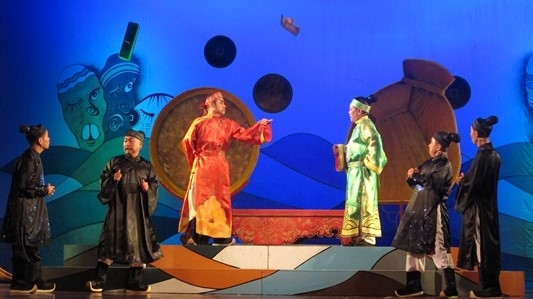
The Vietnam Stage Artists Association (VSAA) will coordinate with other agencies and art troupes to hold various cultural and art activities around the country from now until the end of 2020.
The VSAA will hold various cultural and art activities from now until the end of 2020.
The association will organise a seminar on the merger and socialisation of the stage art units in Quang Ninh province and a conference on the stage industry in Vietnam and the world.
In addition, a wide range of festivals will be held nationwide including a theatrical art festival on the image of public security soldiers (in July); the National Tuong (Classical Drama) and Folk Singing Youth Talent Festival in Binh Dinh province (in August); the fourth Capital Stage Festival and the National Cai Luong (reformed opera) Youth Talent Festival in Ca Mau province.
The VSAA will cooperate with the Hanoi municipal Department of Culture and Sports to hold a ceremony to honour Vietnam’s intangible cultural heritages that have been recognised byUNESCO.
Earlier in May, the association launched a writing camp in Da Lat city, Lam Dong province, with the participation of 20 artists who created many high quality scripts across different art forms.
Another camp is scheduled to be held in the Dai Lai tourist area in Vinh Phuc province; meanwhile, many field trips to the seas, islands and industrial and agricultural economic areas will also be organised for the artists.
Source: NDO
With an increasingly vibrant and widespread emulation movement aimed at building cultured residential areas and cultured families, Yen Thuy District has been making steady progress toward improving both the material and spiritual well-being of its people, while fostering a civilized, prosperous, beautiful, and progressive community.
Once lacking recreational spaces and community facilities, Residential Group 2 in Quynh Lam Ward (Hoa Binh City) has recently received attention for the construction of a new, spacious, and fully equipped cultural house. The project followed the model of state support combined with public contributions in both labor and funding.
The "All people unite to build cultural life" movement, which has been effectively integrated with Kim Boi district’s socio-economic development goals, is fostering a lively spirit of emulation across local residential areas, hamlets, villages, public agencies, and enterprises. In addition, through the initiative, traditional cultural values are being preserved and promoted, while community solidarity and mutual support in poverty reduction and economic development are being strengthened.
A working delegation of the Hoa Binh provincial People’s Committee led by its Permanent Vice Chairman Nguyen Van Toan on June 11 inspected the progress of a project to build the Mo Muong Cultural Heritage Conservation Space linked to tourism services in Hop Phong commune, Cao Phong district.
Born and growing in the heroic land of Muong Dong, Dinh Thi Kieu Dung, a resident in Bo town of Kim Boi district, in her childhood was nurtured by the sweet lullabies of her grandmother and mother. These melodies deeply imprinted on her soul, becoming an inseparable part of her love for her ethnic group's culture. For over 20 years, this love for her hometown has driven Dung to research, collect, and pass down the cultural values of the Muong people to future generations.
In the final days of May, the Ethnic Art Troupe of Hoa Binh Province organized performances to serve the people in remote, mountainous, and particularly disadvantaged areas within the province. These were not just ordinary artistic shows, but they were the meaningful journeys aimed at spreading cultural values, enhancing the spiritual life of the people and contributing to the preservation of ethnic minority cultural identities.


